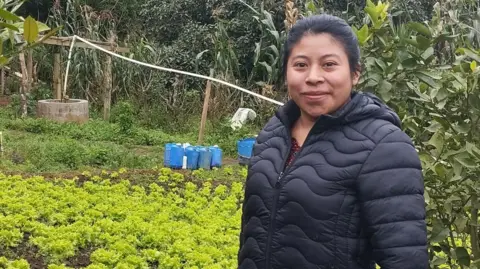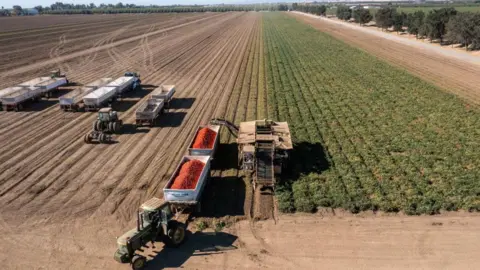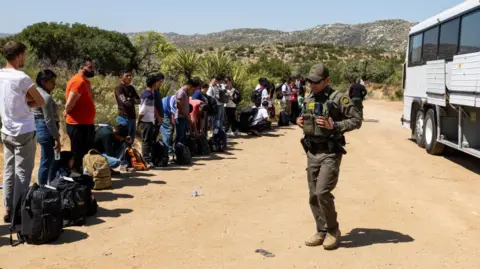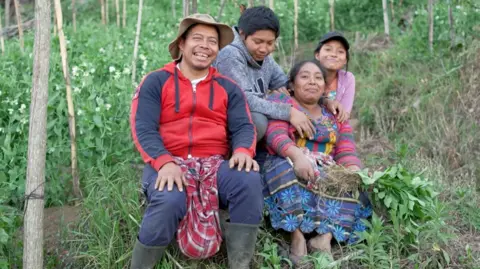This website uses cookies so that we can provide you with the best user experience possible. Cookie information is stored in your browser and performs functions such as recognising you when you return to our website and helping our team to understand which sections of the website you find most interesting and useful.

Business reporter
Guatemala
 BBC
BBCDonald Trump is expected to target undocumented immigrants, most of whom come from Central America, as soon as he takes power next week. What is lesser known is that migrants from some of the same countries have a legal route to work on American farms for a limited time.
Farm labourer Sandra Noemi Bucu Saz is happy.
She's recently returned to Guatemala in Central America from the US, where she was picking strawberries in California.
"They paid us $19 (£15.60) an hour," says Sandra. "We were asked to pick seven boxes per hour, and if we picked more, then we got paid a bit extra.
"It's so different to what I get paid in Guatemala, which is around $10 per day, when there's work."
Sandra is one of around 5,000 Guatemalans who go and work – legally - in the US every year, thanks to a US government visa scheme for temporary agriculture workers from overseas, called H-2A.
This allows US farms that cannot find enough locals to do the work to bring in staff from overseas. The foreign workers can stay for up to 12 months, before they then have to go back to their home countries.
For people like Sandra it's a chance to get on in life, and to help her family by sending back some of the money she earns. In Guatemala there are now around 30 recruitment companies that are registered with the Guatemalan government to help people find temporary work in the US via H-2A visas.
It's a cold, grey, windy day in southern Guatemala as Sanda proudly shows off the plot of land she rents in a place called Las Tres Cruces, high up in the hills near a town where she lives with her family, called Santiago Sacatepéquez.
She and her relatives grow corn, lettuce, beans and spinach for them to eat. And if there's enough left over they sell them at the local market. Sandra's dream is to save enough money to buy some land, so they don't have to rent.
But first she needs to pay off the rest of the debt that she got herself in to after being scammed when she and her sister first tried to get a visa for the United States.
"We paid someone $2,000 per person because we wanted to get work in the US," she says. "My sister and I thought we needed to do this so we could move forward and make our dreams come true. So, we got a loan to get the money, but sadly it was all a scam, and they took our money."
This is common practice for fraudsters in Guatemala, who play with people's desperation to get to the US, and trick them into handing over money.
 Getty Images
Getty ImagesCesia Ochoa is the executive director for the Guatemala branch of a legitimate recruitment company called Cierto. A business that also has offices in the US and Mexico, it is one of the 30 or so officially registered in Guatemala to offer H-2A visas.
"Part of our inspiration for opening an office in Guatemala was to help locals avoid the scams," she says.
When Sandra went to the US via Cierto, she didn't have to pay it a fee. Instead, the company is paid by farm businesses in the US looking for temporary workers.
Ms Ochoa explains: "For us, it's really important that we make a good contact between businesses and the workers, and that the salaries and contract they are offering are real."
While the H-2A visa allows people from Guatemala to legally find temporary farm work in the US, there is estimated to be more than 675,000 undocumented Guatemalans in the US, according to the Pew Research Center think tank.
And a further 200,000 were found to have tried to enter the US without valid documentation in the 12 months to September of last year. That is the third highest number behind Mexicans and Venezuelans.
Olga Romero lives near a town called Olopa in the north-east of Guatemala. She has seven children, two of whom are working in the US without any visas.
"This is a poor region where work is hard to find, and families often pay someone called a coyote between $2,000 and $3,000 to take them to the US illegally," says Olga.
A big problem is that to raise that amount of money many families need to take out loans secured against the value of their home. They can then lose their properties if the money isn't paid back.
And that is often the case, given that the chance of them making it to the US is far from guaranteed, with the risk of accidents along the way, or being turned back at the US border.
But the rewards are high. The money loved ones send back from the US is known as remittances, and these are propping up Guatemala's economy. In 2023 the country received $19.8bn in total remittances from abroad, according to one study from the Inter-American Development Bank.
President Donald Trump has vowed to get tough on undocumented immigrants, and is threatening to carry out mass deportations .
But it is not yet clear if he will make moves to limit, or even stop, H-2A and the other visa schemes for temporary foreign workers.
 Getty Images
Getty ImagesVanessa García, executive director of recruitment organisation Juan Francisco Garcia Comparini Foundation, is optimistic that such visas will continue.
The foundation helps send around 200 Guatemalans a year to work in the US with H-2A visas. These are farm labourers who help to harvest lettuces, cauliflowers, spinach and beans.
"I think that the opportunities for Guatemalans to get an H-2A visa will continue and perhaps even grow," she says. "I am not worried, and I think this is a great opportunity for workers."
Joe Martinez, the US-based founder and CEO of Cierto, says that while he expects the visa scheme to continue under Trump, rights for the foreign workers might be weakened.
"Cierto is concerned that the push to streamline and reduce bureaucratic processes could lead to a program with less worker protections and less oversight."
He is worried that wages could fall for the farmworkers, and that their housing conditions on US farms may worsen.
 Héctor Benjamín Xoc Xar
Héctor Benjamín Xoc XarBack in Guatemala, Héctor Benjamín Xoc Xar, says he has done two working trips to the US via the H-2A visa. The most recent one saw him working in a greenhouse growing vegetables. He says his inspiration is his family.
"I want them to do better than me academically," he says. "I left school when I was still young to work in the fields.
"Before I got this work it looked like my daughter wasn't going to be able to finish her final year studying accountancy because we couldn't afford it, but now I've managed to pay for her and she's working as an accountant."



 Africana55 Radio
Africana55 Radio 

